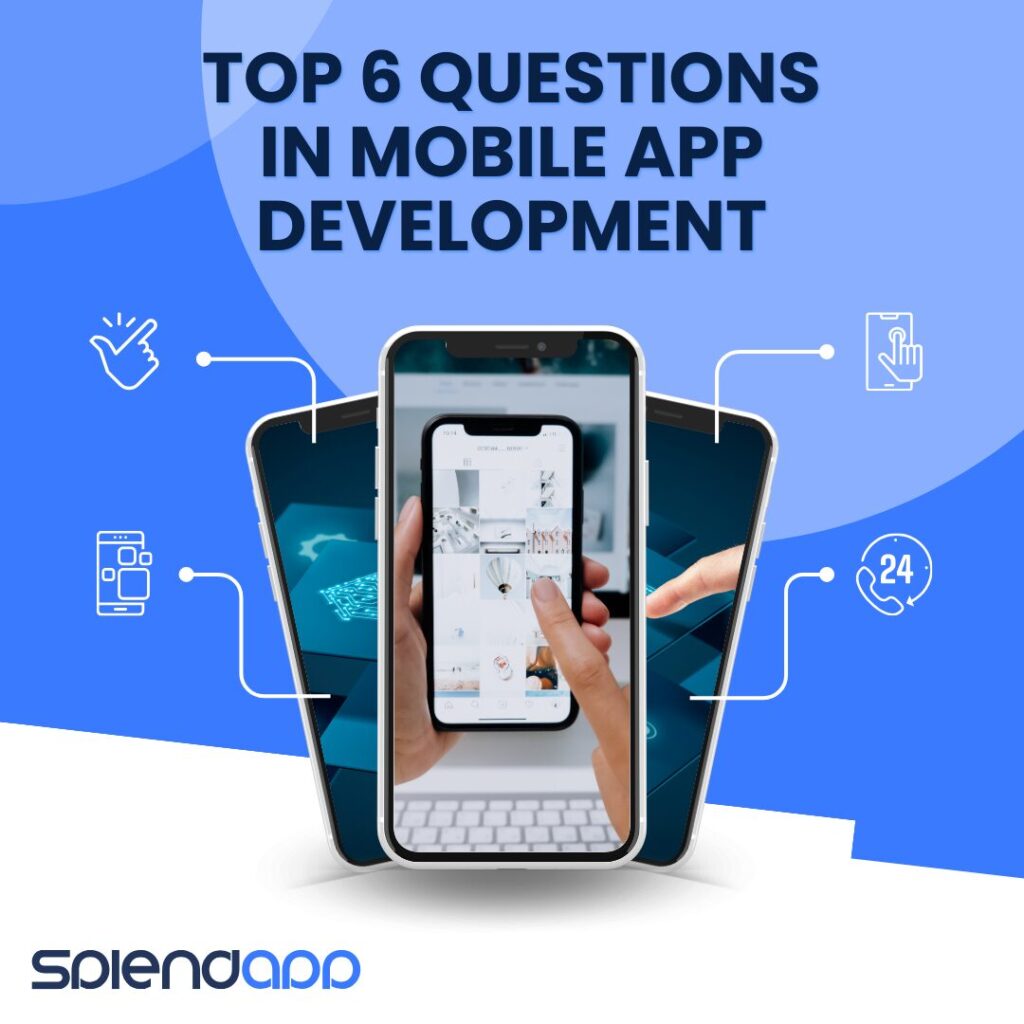

There are frequently asked Questions In Mobile App Development that cover a wide range of important and diverse topics. These questions include topics such as choosing the right tools and languages for app development, dealing with security and privacy challenges, best practices for improving user experience, and effective ways to test and deploy apps.
Developers are also interested in understanding the latest trends in the market, how to achieve a balance between innovation and technical stability, and strategies for improving application performance. The FAQ also includes how to get started in app development for beginners, common challenges developers face, and helpful resources for continued learning in this rapidly evolving field.

“Mobile app” refers to a program or application specifically designed to run on smartphones and other mobile devices, such as tablets. These applications are intended to provide specific functions and services to users, such as:
Communication and social networking: such as messaging applications, email, and social networking.
Entertainment: such as gaming apps, video streaming, and music.
Business and productivity: such as word processing applications, spreadsheets, and project management.
Education: E-learning applications, e-books, and educational courses.
Health and Fitness: Apps for tracking fitness, nutrition, and mental health.
E-commerce: for online shopping and financial services.
Navigation and maps: such as GPS and routing applications.
These applications are designed to be easy to use on touch screens and are intended to take advantage of device features such as the camera, microphone, compass, and various sensors. They can be downloaded from app stores such as Google Play Store or Apple App Store.
Smartphone applications offer a wide range of benefits that improve users’ daily lives in multiple ways:
Accessibility and convenience: Applications provide quick access to services and information. Users can multitask from their mobile devices without the need for computers.
Improve productivity: Apps like notepads, task managers, and calendar apps help organize daily chores and increase productivity.
Communication and social interaction: Messaging and social media apps make it easier to communicate with friends and family, as well as provide a platform to connect with new people.
Education and Learning: Education applications provide valuable educational resources and interactive learning experiences that aid in self-learning and skill development.
Health and Fitness: Health and fitness apps help individuals track their physical activity, and diet, and maintain healthy lifestyles.
Entertainment: Gaming, video, and music applications provide various means of entertainment that can be accessed at any time and place.
E-commerce and financial services: Facilitating purchases and financial transactions, providing a seamless and secure shopping experience.
Navigation and Travel: Maps and travel apps provide vital information about directions, flight bookings, and accommodation, making travel planning easier.
Personalize the experience: Apps allow users to customize their experience according to their personal needs and preferences.
Push notifications: Apps provide notifications to users about important information, such as security updates, news, and other alerts.
All these benefits make phone applications indispensable tools in the modern era, as they contribute to enhancing the efficiency and comfort of daily life.
The latest application and software development techniques are constantly evolving with technological advancement. Some of the most notable of these techniques include:
Artificial Intelligence and Machine Learning: Using artificial intelligence to improve user experience, personalize content, and analyze data more effectively.
Cross-Platform Development: Tools like Flutter and React Native enable developers to write code once and deploy it on multiple operating systems, saving time and resources.
Cloud Computing: Using cloud services such as AWS, Azure, and Google Cloud to enhance flexibility, scalability, and security.
Blockchain: The use of blockchain technology in payment applications, smart contracts, and decentralized applications (DApps).
Internet of Things (IoT): Developing applications that interact with Internet-connected devices, such as smart home devices and sensors.
Augmented Reality (AR) and Virtual Reality (VR) technologies: The use of AR and VR to create interactive and immersive experiences in areas such as gaming, training, and education.
Dynamic UI development: Designing responsive and dynamic user interfaces that adapt to different screen sizes and user preferences.
Advanced Security Technologies: Using technologies such as biometric verification, encryption, and API security to protect applications from security threats.
Graph-based API development (GraphQL): Using GraphQL to provide a more flexible and efficient API.
Continuous Development and Continuous Delivery (CI/CD): Applying CI/CD practices to improve the speed and quality of software development processes.
These technologies provide developers with advanced tools to create applications that are more powerful, interactive, and suitable for the needs of modern users.
Learning programming and application development can be a rewarding and useful path, and the following steps can be followed to get started in this field:
Setting goals: Decide what you want to achieve by learning programming. Do you want to develop web applications, smartphone applications, or games?
Choosing a programming language: Depending on your goals, choose a programming language to start with. Languages like Python and JavaScript are useful for beginners, while Java and Swift are commonly used in mobile app development.
Educational Resources: Use resources such as books, online courses, and educational websites. Platforms like Coursera, Udemy, and Codecademy offer excellent courses.
Practical practice: Programming is a practical skill. Try working on small projects yourself or contributing to open-source projects.
Join programming communities: Communities like Stack Overflow, GitHub, and local programming forums provide support and guidance.
Learn Computer Science Basics: Understanding algorithms, data structures, and software design principles enhance your programming skills.
Learn about development tools: Learn to use basic tools and platforms such as IDEs (integrated development environments), version control systems such as Git, and CI/CD tools.
Build a portfolio: Create a portfolio of your projects and code to show to potential prospects.
Continuous learning: Staying up to date with the latest updates and technologies in the world of programming is very important.
Explore job or training opportunities: Search for opportunities to work as a programmer or participate in training programs to gain practical experience.
Remember that learning programming requires patience and perseverance, but with commitment and consistent practice, you can build strong skills in this field.
Application development includes several technical and administrative challenges, the most prominent of which are:
Cross-device and platform compatibility: Ensuring that the app works well on a wide range of devices and platforms, such as iOS and Android, and addressing resolution and screen size issues.
Manage performance and resource consumption: Optimize app performance and ensure that it does not excessively consume device resources, such as memory and battery.
Data and privacy security: Protect user data and ensure the app complies with privacy regulations such as GDPR.
Platform updates and backward compatibility: Handle frequent operating system updates and ensure that the application remains compatible with older versions.
User Interface and User Experience: Design an attractive and easy-to-use user interface and improve the user experience.
Application Testing and Quality Assurance: Conduct comprehensive testing to detect bugs and vulnerabilities before launch.
Integration with third-party services: Integration with external API and third-party services such as social media and payment systems.
Market Competition: Standing out in the crowded mobile app market and finding a way to make the app stand out.
Resource and Budget Management: Manage time and resources efficiently within the specified budget.
Stay flexible and up-to-date: Adapt to rapid technological changes and update the application regularly to stay compatible and efficient.
These challenges require advanced technical skills, strategic planning, and a good understanding of user needs and expectations.
It plays an important and increasingly important role in application design and development, offering several advantages:
Improving user experience: AI can help make apps more interactive and personal. For example, it can be used to analyze user data and provide personalized recommendations.
Automation and efficiency: AI can automate complex or repetitive tasks, such as testing and data analysis, improving efficiency and reducing human error.
Natural interaction: AI can drive the development of natural user interfaces such as voice assistants and chatbots, making apps more user-friendly.
Data Analysis: Using machine learning techniques to analyze big data can help understand user behaviors and improve app features based on these insights.
Continuous learning and improvement: AI-powered applications can improve themselves over time through machine learning, leading to continuous improvement in performance and functionality.
Prediction and Proactivity: AI can predict potential problems in the application or analyze trends, which helps in making proactive decisions and avoiding mistakes.
Security: In security, AI can recognize suspicious behavior patterns and combat cyberattacks more effectively.
Decision support: AI can help developers make data-driven decisions about improving and updating the app.
In short, AI enhances the capabilities of applications and makes them more intelligent, interactive, and able to deliver an enhanced and more personalized user experience.
In the world of app development, frequently asked questions range from areas such as choosing the right tools and programming languages, dealing with security and privacy challenges, and best practices for improving user experience.
Application development requires a deep understanding of the latest technology trends, such as artificial intelligence, cross-platform application development, and cloud computing. Developers and Splendapح Company They care about the balance between innovation and technical stability, and seek to improve application performance through advanced technologies.
For beginners, the focus is on how to get started in app development, common challenges, and helpful educational resources. These areas highlight the importance of continuing learning and professional development to keep pace with this rapidly changing sector.